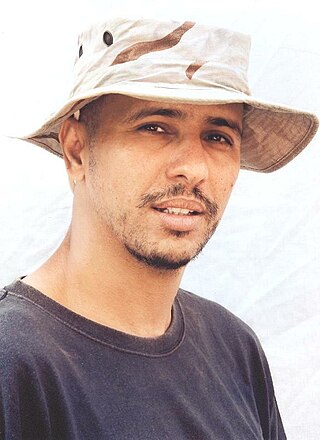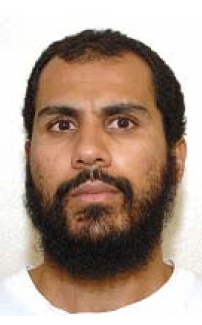Related Research Articles

Mohamedou Ould Slahi is a Mauritanian citizen who was detained at Guantánamo Bay detention camp without charge from 2002 until his release on October 17, 2016.

Moazzam Begg is a British Pakistani who was held in extrajudicial detention by the US government in the Bagram Theater Internment Facility and the Guantanamo Bay detainment camp, in Cuba, for nearly three years. Seized by Pakistani intelligence at his home in Pakistan in February 2002, he was transferred to the custody of US Army officers, who held him in the detention centre at Bagram, Afghanistan, before transferring him to Guantanamo Bay, where he was held until January 2005.
Isa Khan is a citizen of Pakistan who was held in extrajudicial detention in the United States Guantanamo Bay detention camps, in Cuba. His Guantanamo Internment Serial Number was 23.

Abdul Zahir (عبدالظاهر) is a citizen of Afghanistan currently held in extrajudicial detention in the United States' Guantanamo Bay detention camps, in Cuba. He was the tenth captive, and the first Afghan, to face charges before the first Presidentially authorized Guantanamo military commissions. After the Supreme Court ruled that the President lacked the constitutional authority to set up military commissions, the United States Congress passed the Military Commissions Act of 2006. He was not charged under that system.
The Guantanamo Bay detention camp is a United States military prison within the Guantanamo Bay Naval Base, also referred to as Gitmo, on the coast of Guantánamo Bay in Cuba. As of March 2022, of the 780 people detained there since January 2002 when the military prison first opened after the September 11 attacks, 741 had been transferred elsewhere, 30 remained there, and 9 had died while in custody.

Yasin Qasem Muhammad Ismail is a Yemeni held in extrajudicial detention in the United States Guantanamo Bay detainment camps, in Cuba. His Guantanamo Internment Serial Number is 522. Joint Task Force Guantanamo counter-terrorism analysts estimate he was born in 1979, in Ibb, Yemen.

Khairullah Said Wali Khairkhwa is the Afghan Minister of Information and Culture and a former Minister of the Interior. After the fall of the Taliban government in 2001, he was held at the United States Guantanamo Bay detainment camp in Cuba for 12 years. He was released in late May 2014 in a prisoner exchange that involved Bowe Bergdahl and the Taliban five. Press reports have referred to him as "Mullah" and "Maulavi", two different honorifics for referring to senior Muslim clerics.
Taj Mohammed is a citizen of Afghanistan who was held in extrajudicial detention in the United States Guantanamo Bay detention camps, in Cuba. His Guantanamo Internment Serial Number was 902. Joint Task Force Guantanamo counter-terrorism analysts estimate Mohammed was born in 1981. He was repatriated in 2006.
Mohammed Saghir(also transliterated Mohammed Sanghir) is an elderly Pakistani who was held by the U.S. military in the United States Guantanamo Bay detention camps, in Cuba. His Guantanamo Internment Serial Number was 143. Joint Task Force Guantanamo counter-terrorism analysts estimate he was born in 1952, in Kohestan, Pakistan.

Obaidullah is a citizen of Afghanistan who was one of the last remaining Afghan detainees held in extrajudicial detention in the United States Guantanamo Bay detention camp, in Cuba. He was captured as an Enemy combatant on July 20, 2002, transferred to Guantanamo on October 28, 2002, and transferred to the United Arab Emirates on August 15, 2016. Obaidullah's Guantanamo Internment Serial Number is 762. American intelligence analysts estimate that Obaidullah was born in 1980 in Khowst, Afghanistan.

Mohamed Jawad, was accused of attempted murder before a Guantanamo military commission on charges that he threw a grenade at a passing American convoy on December 17, 2002. Jawad's family says that he was 12 years old at the time of his detention in 2002. The United States Department of Defense maintains that a bone scan showed he was about 17 when taken into custody.
Swar Khan also known as Swatkhan Bahar is a citizen of Afghanistan, who was held in extrajudicial detention in the United States's Guantanamo Bay detention camps, in Cuba.
The United States Department of Defense (DOD) had stopped reporting Guantanamo suicide attempts in 2002. In mid-2002 the DoD changed the way they classified suicide attempts, and enumerated them under other acts of "self-injurious behavior".

Zahar Omar Hamis Bin Hamdoun is a citizen of Yemen, held in extrajudicial detention in the United States Guantanamo Bay detainment camps, in Cuba. His Guantanamo Internment Serial Number is 576. The Department of Defense reports that he was born on November 13, 1979, in Ash-Shihr, Yemen.
Adil Hadi al Jazairi Bin Hamlili is a citizen of Algeria who was held in extrajudicial detention in the United States Guantanamo Bay detainment camps, in Cuba. The US Department of Defense reports that Bin Hamlili was born on 26 June 1976, in Oram (Oran) [sic] Algeria. His Guantanamo Internment Serial Number was 1452.
Asadullah Jan is a citizen of Pakistan who was held in extrajudicial detention in the United States's Guantanamo Bay detention camps, in Cuba. His Guantanamo Internment Serial Number was 47. Joint Task Force -- Guantanamo analysts estimate he was born in 1981. However, he says he was only sixteen when he was captured in 2001.

After the United States established the Guantanamo Bay detention camp at its naval base in Cuba, officials occasionally allowed Guantanamo captives' phone calls to their family. In 2008 the Joint Task Force Guantanamo that manages the camps developed rules regarding phone calls: all detainees who met certain conditions were allowed to make one call home per year.
Alif Khan is a citizen of Afghanistan who was held in extrajudicial detention in the United States's Guantanamo Bay detention camps, in Cuba. His Guantanamo Internment Serial Number was 673.

Carol Rosenberg is a senior journalist at The New York Times. Long a military-affairs reporter at the Miami Herald, from January 2002 into 2019 she reported on the operation of the United States' Guantanamo Bay detention camps, at its naval base in Cuba. Her coverage of detention of captives at the Guantanamo Bay detention camp has been praised by her colleagues and legal scholars, and in 2010 she spoke about it by invitation at the National Press Club. Rosenberg had previously covered events in the Middle East. In 2011, she received the Robert F. Kennedy Journalism Award for her nearly decade of work on the Guantanamo Bay detention camp.
References
- ↑ Mahvish Biography
- ↑ United States Public Records, 1970-2009 (Florida, 2007)
- 1 2 Mahvish Khan (April 30, 2006). "My Guantanamo Diary: Face to Face With the War on Terrorism". Washington Post. pp. B01. Retrieved January 19, 2008.
- 1 2 Nathaniel French (June 22, 2008). "Review: Translator gives an inside view in 'My Guantanamo Diary'". St Petersburg Times. Archived from the original on August 9, 2008. Retrieved June 22, 2008.
- ↑ C. Cem Oguz (August 1, 2010). "WikiLeaks: Ethics to what extent?". Hürriyet Daily News and Economic Review. Archived from the original on September 4, 2010. Retrieved August 2, 2010.
Much to her surprise, Khan soon discovered many of the detainees she encountered were merely average citizens handed over to U.S. authorities, often by bounty hunters.
- ↑ LinkedIn Profile
- ↑ "UM Law alumna Mahvish Rukhsana Khan authors book about Guantanamo Bay". University of Miami School of Law. Archived from the original on August 17, 2008. Retrieved May 7, 2010.
- ↑ Mahvish Khan (February 25, 2010). "Detainee dilemma". Daily Times (Pakistan).
He described how he was beaten regularly by Americans in civilian clothing. More painful than the bruises and wounds that covered his body were the unbroken days and nights without sleep. Tape recordings of screeching sirens blared through the speakers that soldiers placed by his ears. His head throbbed. Whenever he managed, mercifully, to doze off, he would be startled awake by wooden clubs striking loud blows against the wall. He recalled the sting as he was repeatedly doused with ice water. He said he was not allowed to sit down for two weeks straight. At some point his legs felt like wet noodles; when they gave out, he was beaten and forced to stand back up. He could not remember how many times this happened.
- ↑ Interpreter Details Detention In 'My Guantanamo', National Public Radio , July 21, 2008